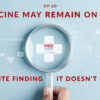At MedShadow, we love pharmacists. That’s because our mission is to protect you from the side effects of drugs. Doctors are great; they are disease and health specialists. Pharmacists are medication managers. We consider pharmacists to be your last line of defense before a medical prescription error reaches you.
Your pharmacist makes sure you get the medicine your doctor ordered, in the amount specified, and clearly explains to you how to take it (with food? In the morning? etc.). If the prescription is unclear or if the doctor ordered a drug that will conflict with your other medicines or supplements, your pharmacist will reach out to your healthcare provider and can save you from adverse events that could land you in the hospital or worse.
That’s why we recommend that you use only one pharmacy to fill your prescriptions and use that same pharmacy to buy your over-the-counter (OTC) meds and vitamin/herbal supplements. That way, when you are trying to remember if you are supposed to use acetaminophen or ibuprofen for your headache, your pharmacist is right at the counter and can tell you for sure. All for the price of a prescription.
But what happens when pharmacies are understaffed? When lines are long? When everyone has questions that day? What happens when that is every day?
That’s what pharmacists at Walgreens are complaining about amid recent “walkouts.” Pharmacists are human, too. In the past few years, pharmacists have been shouldering some of the wellness care that doctors and their staff historically managed. Flu shots, Covid shots, RSV shots, smoking cessation, cholesterol management, and blood pressure can all be handled at the pharmacist’s counter. In some cases, pharmacists can order medicine for you without consulting with a doctor. Pharmacists can conduct a review of all your meds and work with your doctor to eliminate some if no longer indicated (a process called deprescribing). And pharmacists field problems with insurance covering drugs.
Short staffing can lead to shortcuts. Did your pharmacists have the three minutes it might take to make sure your new medicine doesn’t have bad interactions with your old medicine?
Walgreens is experiencing pharmacist walkouts because of the understaffing problem. Pharmacists told CNN, “increased demand for prescriptions, shots, and other services without sufficient staff to fulfill the orders made it nearly impossible to do their jobs properly and created potentially unsafe conditions for customers.”
Just last month, CVS was forced to close 22 pharmacy locations during two different walkout events. Spanning two weeks in the Kansas City area, these planned protests prompted the Rhode Island-based CVS to meet with its staff. Staff was reassured with promises of additional support and higher overtime pay.
Even though we call pharmacists your “last line of defense,” in reality you are your own last line of defense. During walkouts or when you can see the pharmacist is overwhelmed, or any other time you are buying a drug from the pharmacy, you have to make the final decision on safety.
Check your prescription before you leave the pharmacy counter. Make sure it is the drug your healthcare provider ordered and that the instructions match what the doctor told you in the office. If you have a question, insist on speaking with the pharmacist directly. Your life could depend on it.






